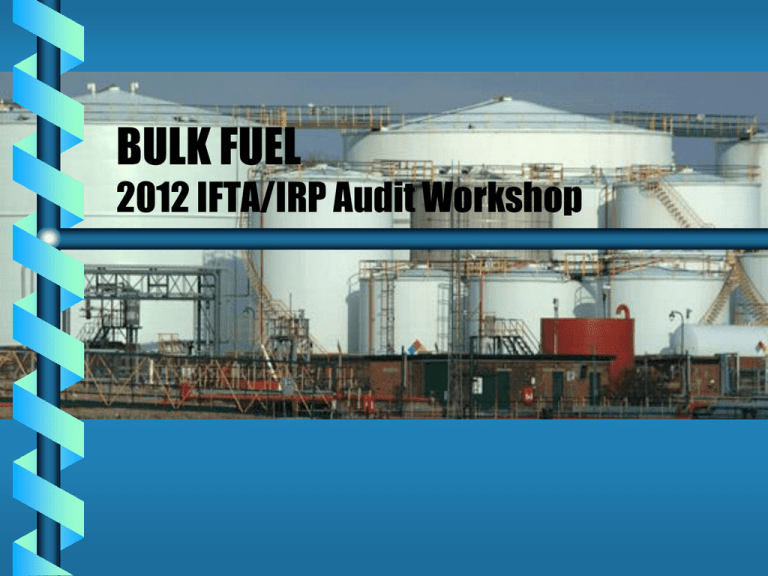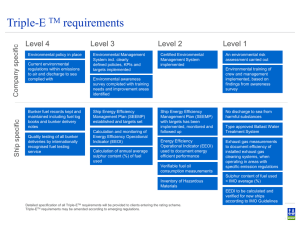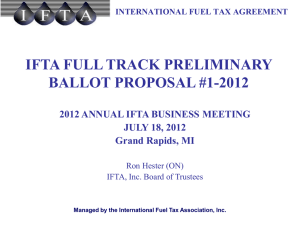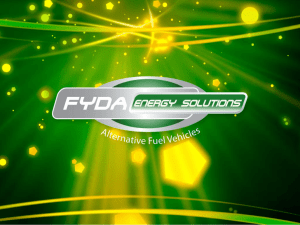Adv Audit Techniques – Bulk Fuel
advertisement

BULK FUEL 2012 IFTA/IRP Audit Workshop OBJECTIVE • Give a broad overview of bulk fuel and its unique position for creating audit problems and its relationship to miles. Why Have Bulk Fuel? ADVANTAGES – Convenient Carrier gets fuel delivered – Records Compressed 4,000 gallon delivery -vs. 20 O.T.R. fuel receipts – Simplified Payment 1 check vs. petty cash DISADVANTAGES Need Physical Setup Pumps , Tanks Meters, Dipsticks Hazardous Material Potential Liability Control Inventory Disbursement Records Reconciliations SAVINGS ? ? ? Bulk vs. O.T.R. purchases NO real cost savings when all aspects of bulk fuel are taken into consideration. facility potential software personnel BULK FUEL TERMS SUPPLIER/JOBBER • petroleum middle man or marketer, usually dealing in bulk fuel, may be wholesale, retail or both. DELIVERY LOADS STANDARD LOAD – Diesel 7,000 gallons, occasionally 7,500. LTL – Less than truck load, 500 up to 6,500 gallons. DIPSTICK wooden stick used to measure depth of fuel in a bulk tank. inches converted into gallons, specific chart for specific tank. WATER PASTE • pale green substance smeared on stick • detects water in fuel or tank, • turns bright purple in water. SHORTAGE/OVERAGE • difference between calculated ( book ) inventory and actual physical stick inventory. CLOUD POINT Diesel gels at 39-42 degree F 2 Ways to Handle Bulk Fuel Carrier pays taxes direct to supplier Carrier pays NO tax when purchased tax paid under separate file to the jurisdiction where the fuel was purchased and stored. or No tax is paid until the IFTA tax return is filed. GUIDELINES IFTA Articles of Agreement, Article X R1020 BULK FUEL PURCHASES R1020.200 A licensee may claim a tax-paid credit on the IFTA tax return for fuel withdrawn from bulk storage only when the fuel is placed into the fuel tank of a qualified motor vehicle; the bulk storage tank is owned, leased, or controlled by the licensee; and either the purchase price of the fuel includes fuel tax paid or the licensee has paid the fuel tax to the member jurisdiction where the bulk fuel storage tank is located. R1020.300 The licensee’s records must identify the quantity of fuel taken from the licensee’s own bulk storage and placed in its qualified motor vehicles. Recordkeeping requirements for tax paid bulk fuel purchases are provided in IFTA Procedures Manual. IFTA Procedures Manual P550 FUEL RECORDS P550.300 Retail fuel purchases and bulk fuel purchases are to be accounted for separately. IFTA Procedures Manual P570 Tax Paid Bulk Fuel Purchases P570.100 Bulk fuel is delivered into a storage tank owned, leased, or controlled by the licensee… and fuel tax may or may not be paid… at the time of delivery. Copies of all delivery tickets and/or receipts must be retained by the licensee. P570.300 Bulk fuel inventory reconciliations must be maintained. In the case of withdrawals from bulk storage, records must be maintained to distinguish fuel placed in qualified vehicles from other uses. RECONCILIATION BULK FUEL INVENTORY Beginning Inventory + purchases - withdrawals _______________ + _______________ - _______________ = _________________ _______________ = Calculated Ending inventory (book) vs. actual ending inventory (physical reading) difference (+/-) There is going to be variances between physical inventory and book inventory. P570.400 A licensee may claim a tax-paid credit on the IFTA tax return for bulk fuel only when…the fuel is placed into the fuel tank of a qualified motor vehicle; and either the purchase price of the fuel includes tax paid to the member jurisdiction where the bulk fuel storage tank is located, or has paid fuel tax to the member jurisdiction where the bulk fuel tank is located. P570.400 cont’d The licensee shall maintain the following records: .005 Date of withdrawal .010 Number of gallons or liters .015 Fuel type .020 Unit number .025 Purchase & inventory records to substantiate that tax was paid on all bulk purchases The reconciliation lets the Carrier know if they have: –a leak –a thief –missing fuel deliveries –errors in stick readings –other problems? Internal Control Procedures BULK STORAGE INTERNAL CONTROL STRUCTURE Determine if the company has bulk storage and how many locations. Determine if bulk storage is purchased with or without tax paid. Determine if the Carrier reconciles to a meter or physical inventory. Determine if the facility is on a key lock system. Determine storage capacity. INTERNAL CONTROL cont’d Determine who has access to bulk storage and who makes withdrawals. ( 3rd party?) Determine who the fuel suppliers are. Determine what the Carrier does about differences that cannot be accounted for. Determine where the bulk storage area is and if it is in a secured area. INTERNAL CONTROL cont’d Determine how many bulk storage areas there are and where. Determine what vehicles are allowed to use the fuel from bulk storage. Determine how often physical inventories and meter readings are taken. Determine if the meter for withdrawal is a totalizing meter reading. ( accumulative) BULK FUEL TESTING When testing bulk storage records, the auditor must test the entire process. Procedures should be implemented to test the bulk storage accounting system. BULK FUEL TESTING PROCEDURES 1. Obtain reconciliation of bulk storage and test mathematical accuracy. 2. Reconcile beginning inventory balance to prior period’s ending balance. 3. For purchases on the reconciliation, check gallons purchased to delivery receipts. TESTING PROCEDURES cont’d 4. If available, reconcile purchases for the period to the supplier(s) end of month statement, other billing record and/or accounts payable vendor records. 5. Assure that the quantity purchased is =/> quantity on withdrawal records. 6. Inquire about any shortages. Ask how such shortages are handled for fuel tax reporting. TESTING PROCEDURES cont’d 7. Reconcile gallons drawn from bulk tanks to supporting withdrawal records. Determine whether withdrawals are properly classified as On Highway Vehicle Use (taxable) into qualified vehicles or other types of use (non-taxable), such as refrigeration units, equipment, or nonqualified vehicles. AUDIT DOCUMENTATION IFTA Audit Manual A680.200 Support Documentation .005 Detail Information … is documentation of actual records reviewed, which support the audit results. Detail information includes, but is not limited to, the following: A680.200.005 cont’d detail of retail or bulk fuel purchases detail of bulk fuel withdrawals STRAW POLL How would you or your jurisdiction handle the following situation? Bulk Fuel Situation During the audit of XYZ company, you discover that the Carrier has a 5,000 gallon bulk fuel tank without a withdrawal log. The Carrier has 10 IFTA/IRP units fueling from the tank, as well as 10 non-qualified units. The Carrier has no other alternative documentation to separate out the qualified vs. non qualified fuel going out of the tank. The Carrier tells you, they just “guesstimated” the gallons coming out of the tank which they reported on the IFTA return. How do you handle fuel credit in the absence of bulk fuel withdrawal logs? 17 jurisdictions polled 27 respondents 31 responses THE RESULTS 23% Disallow tax-paid credits. 19% Give tax-paid credit for industry average MPG. Using mileage, back into total fuel and give tax-paid credit only for the resulting amount of fuel. 16% Reduce the MPG to 4.00. 10% A percentage allocation of fuel to qualified and nonqualified vehicles. 10 qualified, 10 nonqualified, 50/50 15 qualified, 5 nonqualified, 75/25 10% Give the licensee 30 days to put in a meter and go back and audit. THE RESULTS cont’d 3% Determine company 6.5% Assign 4.0 MPG to standard for fuel for each unit. Using qualified units, disallow audited mileage for left-over fuel. each unit, give tax3% Allocate a percentage paid credit only for the tax-paid fuel based on resulting fuel. the total number of 6.5% Reduce the MPG, not necessarily to 4.0. vehicles having access to the tank. 3% Didn’t want to get into trouble, so no answer. QUESTIONS Which of the following must the licensee maintain complete records of: (May choose more than one) A. All motor fuel used B. All motor fuel purchased C. All motor fuel received D. All motor fuel sold When testing the fuel recorded on the licensee’s system, the auditor will examine the selected IVDR’s to determine if: A . They contain all the basic information required B . Fuel receipts contain all of the required information C . Bulk fuel withdrawals are documented D . All of the above With regard to fuel records that an IFTA licensee must retain, which of the following statements is false? A. The licensee must retain complete records of all motor fuel purchased, received and used in the conduct of its business. B. Separate totals must be compiled for each motor fuel type. C. Retail fuel purchases & bulk fuel purchases are to be accounted for separately. D. None of the above What information is needed in order to do accurate bulk fuel reconciliation ? A. Fuel purchased by third party B. Beginning & ending stick/physical readings C. Gallons purchased D. Tax paid on gallons purchased E. Beginning & ending meter readings F. Name of person doing physical reading G. B, C and E H. All of the above TRUE OR FALSE? Bulk fuel delivered into storage facilities maintained by the licensee may or may not be tax paid at the time of delivery. TRUE OR FALSE? A licensee may claim a tax-paid credit on the IFTA return for bulk fuel only when the storage tank from which the fuel is withdrawn is owned, leased or controlled by the licensee; the fuel is placed into the fuel tank of a qualified vehicle and either the purchase price of fuel includes tax paid to the member jurisdiction where the storage tank is located or the licensee has paid fuel tax to the member jurisdiction where the bulk fuel storage tank is located. TRUE OR FALSE? The base jurisdiction can waive the requirement of unit numbers for fuel withdrawn from the licensee’s own bulk storage and placed in its qualified motor vehicles? THE END






